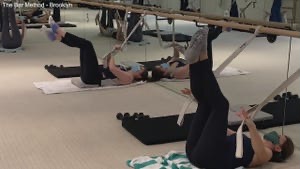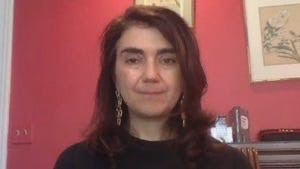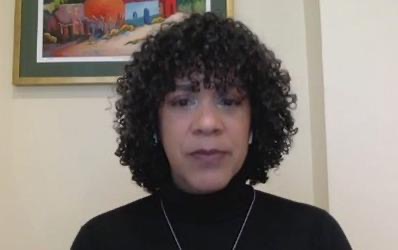-
Small Business Spotlight: Gyms Feel Weight of the Pandemic 13 Months Later
Post Views: 999By Joe Connolly and Neil A. Carousso
NEW YORK (WCBS 880) — While people start to think about getting in shape for the summer, fitness gyms are struggling to stay open.
Indoor fitness classes in New York City are allowed at 33 percent capacity. Outside of the city, gyms may increase their capacities from 33 percent to 50 percent on May 15. Many gym owners say it’s not enough to sustain as the COVID-19 pandemic nears its 14th month.
“Right now, we offer in-person classes but also online classes as well and some people do both,” said Katie Muehlenkamp, Brooklyn franchisee of The Bar Method with locations in Cobble Hill and Williamsburg.
On the WCBS Small Business Spotlight, sponsored by Dime Community Bank, Muehlenkamp told Joe Connolly and Neil A. Carousso that online classes have only supplemented her revenue.
“I generally find that people either prefer one or the other,” she said. “People who come back in-person generally just do the in-person, because they feel and see the value of being in-person much more.”
Muehlenkamp, a former competitive gymnast and instructor at the company’s flagship studio in San Francisco, said online classes can only work for a “small subset of people” because The Bar Method requires more space than a Brooklyn studio apartment. It consists of isometric exercise; small motions work targeted muscles to build strength.
She also said in-person classes offer a sense of camaraderie and accountability for one’s fitness goals that her clients are “craving.”
“We’re human beings. We have a fundamental desire to be around other people and fitness is just one aspect of it,” Muehlenkamp said.
But right now, The Bar Method hosts less than 40 classes a week with 10 people max. Pre-pandemic, they ran 80 in-person classes with up to 30 people in each class. They are now offering meditation classes at the Williamsburg location as clients seek mental health services to cope with the pandemic.
“I think there’s a huge generational group that’s looking for those outlets,” she said, noting other gym owners are launching adjacent health and wellness services.
Muehlenkamp is advocating for the GYMS Act of 2021, which would authorize the U.S. Small Business Administration to make initial and supplemental grants to privately owned fitness gyms that have struggled in the pandemic.
She received two Paycheck Protection Program (PPP) loans to pay employees and the SBA provided relief on business loans she obtained to open her franchises. But, the biggest sense of relief came when her landlords agreed to reduce her rents.
“I think they get it. I mean these are smart people,” Muehlenkamp said, acknowledging her landlords have their own financial obligations.
She said she approaches her negotiations with full disclosure and candor.
“It’s kind of like, ‘Okay, well if you don’t lower it to about the amount that I’m talking about, this business isn’t viable. Here’s my financial statements. I’m not hiding anything. This is the situation,'” Muehlenkamp explained.
While she feels uncertain about the fitness industry’s future, Muehlenkamp told Connolly and Carousso she is encouraged by new small businesses that are catering to current market needs.
Watch the Small Business Spotlight video above for more advice for fitness gyms and other hard-hit industries.
-
WATCH: One-on-One with NYC Mayoral Candidate Scott Stringer
Post Views: 982By Lynda Lopez, WCBS Newsradio 880
NEW YORK (WCBS 880) — City Comptroller Scott Stringer got a boost in the mayor’s race this week with an endorsement from the United Federation of Teachers.
Stringer has been in New York City politics for about three decades, but has struggled to gain momentum.
He tells anchor Lynda Lopez for this week’s 880 Weekly Rewind that he believes his government experience is a critical advantage in leading the city’s economic recovery, reopening schools and jump-starting the city’s culture and entertainment.
“I’m good to go if the voters will have me, these are very serious issues. We cannot get this wrong and don’t need a mayor, or can afford a mayor on training wheels who has no experience working in government, understanding that we have to navigate Washington, Albany and City Hall,” Stringer said. “We need a mayor who can build real affordable housing, we need a mayor who’s going to invest in the education of all our children, not just some, we need a mayor who understands the health disparities that COVID brought to bear and has a plan to address those issues and no one in this race has my government experience and my progressive agenda that can bring the city back to life, bring the city back to life open the economy differently than we closed it.”
A recent NY1/IPSOS poll showed Stringer rising to third place behind Andrew Yang and Brooklyn Borough President Eric Adams in the mayoral race just two months ahead of the primaries.
“I think momentum is clearly coming our way because I have a real vision for how to open this economy, how we’re going to put people back to work, bring New York City back to life and I’ve got the skills to do it,” Stringer said. “I have the experience, I’m ready on day one.”
The poll finds COVID, crime and affordable housing matter most to New Yorkers when it comes to choosing the next mayor, but with the conviction of Derek Chauvin in the murder of George Floyd this week, racial justice and police reform are top of mind for many people around the country.
Stringer called it a “verdict in the interest of justice,” but said this is not a time for celebration.
“While we did see justice in the case, we have so much more to do and the next mayor has to be at the epicenter of this,” Stringer said. “It’s time now to think about a police department that believes in one standard of justice, does not overpolice Black and Brown communities.”
He would make police reform a priority and has developed a public safety plan that would allow the police to catch dangerous criminals, but also reimagine how to better respond to 911 calls involving mental health, quality of life and wellness issues.
“We cannot have the same department making the same mistakes over and over again,” Stringer said. “We need to focus police on doing police work and we need to focus city government on making sure that we have a different response to people who have mental health issues, a different response when it comes to working with our young people, we need more mentors and violence interrupters in communities to work with our children, to keep them out of the criminal justice system. Right now, we have a status quo situation in New York City and other cities are starting to think differently about how we can create a public safety plan. I have a public safety plan that I’ll put into effect on day one, but this is a conversation that cannot end with the George Floyd verdict, it has to be an ongoing discussion about how to bring justice to our streets and also make sure New Yorkers are safe. We have to understand that we can do both and we must do both.”
Stringer is also concerned learning loss will have a dire impact on school children in low-income neighborhoods.
“The first thing we have to do is make sure our kids will get the tutoring services they need, the mental health services they need. My kids have gone through a very tough year but their mom and dad have a certain amount of privilege that can deal with these issues, I worry about the kids in homeless shelters and the kids in public housing who didn’t have remote learning devices or didn’t have internet access. The next mayor’s got to level the playing field for these children and I can’t wait to get started fighting for every one of our kids,” Stringer said.
Stringer, a parent of two New York City public school students, said he would immediately meet with principals, teachers and parents to get kids back in classrooms.
Stringer said he will also prioritize reopening small businesses and providing them economic assistance to help bring the city back from the devastation of the pandemic. He believes the next mayor must focus the recovery on the middle class and the working poor.
https://omny.fm/shows/880-weekly-rewind/the-floyd-case-verdict-j-j-vaccine-plus-scott-striHear deeper analysis of the top stories of the week and original reporting on The 880 Weekly Rewind hosted by Lynda Lopez Friday nights at 7 PM on WCBS-AM New York. Listen to this week’s full show, produced by Neil A. Carousso, on the media player above.
-
‘Influence starts with listening’: High-powered business coach on inspiring results
Post Views: 827By Joe Connolly and Neil A. Carousso
NEW YORK (WCBS 880) — The most successful business leaders inspire and motivate their employees to do their best work.
“The number one reason people will do things for you is because they like you,” said Alisa Cohn – a former startup CFO who blossomed into a startup and CEO coach, advising the leaders of major corporations such as Pfizer, Microsoft, Google and IBM.
Cohn writes, “Influence is the way you get others on board and sell your ideas.” On the WCBS Small Business Spotlight, sponsored by Dime Community Bank, she elaborated by telling Joe Connolly and Neil A. Carousso that “influence starts with listening” to employees’ perspectives and aspirations.
“When you listen to people and hear back what they say, that is the way people begin to start liking you, appreciating you, and that relatedness is going to help you sell ideas even if they’re a little bit controversial to the person that you’re talking to,” she explained.
This effort to understand diverse views will put workers in the best position to succeed and achieve corporate goals.
“You can’t just tell people what to do even if you’re the boss,” Cohn said, adding, “They don’t do what you want them to do just because you want them to do it, and if they did, they’re not really the best workers because you want people who are innovative, and creative, and resourceful. You don’t just want compliant order takers.”
The highly regarded business coach and guest lecturer at Harvard University and Cornell University allows it’s hard work to cultivate a team of entrepreneurial-minded employees, but that will foster sustainable growth.
“If you invented and are now building a startup around a new way of doing COVID testing that’s quick and easy, that’s fantastic but that may not be the market need over time,” Cohn said of sustainability in an unprecedented business climate. “You got to expand that to think overall about doing testing of other kinds of things so that people can get the information they need, because they don’t necessarily need to know forever if they have COVID, but they do need to understand important health information about themselves over time.”
Cohn told Connolly and Carousso the best way to grow a brand is to build a strong reputation and find opportunities to disseminate your ideas with potential customers and the business community.
“It’s very helpful to share your ideas on a blog, get published, and over time get published on more and more prestigious and high-end publications so your ideas have merit,” she said.
Links to publications where you and your business were quoted or featured on your website are effective marketing tools along with client testimonials. Cohn calls this “social proof” whereby those with whom you’ve done quality business are implicitly or explicitly endorsing your services.
Learn how to grow a sustainable business and empower your workers to deliver results on the Small Business Spotlight video above.
-
WATCH: One-on-One with NYC Mayoral Candidate Dianne Morales
Post Views: 853By Lynda Lopez, WCBS Newsradio 880
NEW YORK (WCBS 880) — New Yorkers will have their first experience with ranked choice voting in the June 22nd Democratic primary.
City residents may rank their top five mayoral candidates and this week the Working Families Party chose their top three progressives: Scott Stringer, Dianne Morales and Maya Wiley — in that order.
Anchor Lynda Lopez spoke with Morales for this week’s 880 Weekly Rewind, which airs Fridays at 7 PM, and asked her what the endorsement means to her campaign.
“My campaign has actually been focused on centering and elevating the voices of some of the most vulnerable New Yorkers and I think that getting this sort of nod from the Working Families Party is an acknowledgment that we have actually been very effective in doing that,” Morales said. “My campaign is also a very non-traditional campaign and it was not expected to actually get this far, so I think that it’s a great affirmation and attestation to what we’ve done and I’m very proud of that.”
Morales helped open the Office of Youth Development while working at the city’s Department of Education from 2002 to 2004.
Since then, she led several non-profits that focused on youth development. Morales had been executive director of the Phipps Neighborhoods for a decade, helping families in low-income communities in the South Bronx overcome poverty, when she decided to run for mayor.
Her priorities include reforming the city housing authority, building affordable housing, and providing a guaranteed minimum income.
Morales, who spent decades leading local non-profits in low-income communities, fears the coronavirus pandemic is far from over.
In the wide-ranging interview, she told Lopez that her job as mayor would be to implement a more proactive approach to crises like the pandemic, noting the inequities in those suffering the most.
“I think it is true that COVID-19 just further exacerbated and exposed the pandemics of inequality and racism. We had for too long, from an investment perspective, focused on reacting on the backend rather than preventing things,” Morales said. “We should have paid people to stay home early on so that we could actually get the pandemic under control and people didn’t have to feel like they had to risk their lives in order to provide for their families, and we should’ve protected those people who we knew we needed to actually keep things going, both in terms of the PPE and prioritization in terms of vaccination. I still think those things are relevant today because I don’t think we’re in the clear from the COVID-19 pandemic at all, so I think that’s what we need to be focusing on.”
In terms of vaccine rollout, Morales said the city should look at prioritizing communities that have been hit the hardest and working to remove the barriers preventing access to technology and the portals to sign up for an appointment.
“It should be easy to access, there should be a combination of advance appointments and walk-in opportunities, there should be a mobile unit on your corner so you can access that,” Morales said.
Morales is running for mayor on a platform of slashing the NYPD budget by $3 billion and reallocating those funds to community-based organizations to address quality-of-life crimes.
If elected, Morales would be the city’s first Afro-Latino mayor and she notes the national reckoning on race is at the heart of campaign.
She said the calls for racial justice in the wake of the police shooting of Daunte Wright and killing of George Floyd is a priority.
“I’m so tired of marching for our lives,” Morales said. “And I think we need to be able to actually act in a whole different kind of way.”
Morales said the majority of cases that police respond to are not actual crimes in progress, but involve issues of mental health, housing and substance abuse and the response should be catered to address those needs.
“I’ve called for the creation of a Community First Responders Department that would instead be staffed by professionals or staff that are skilled and trained in intervention and de-escalation, and who would act as a part of a broader ecosystem of human service providers and community-based organizations to connect people to what they need,” Morales said. “Right now, we have someone with a mental health crisis, a man with a gun responds and the best case scenario, that person gets locked up overnight and released the next day back to the very same situation and in the worst case scenario they get shot and killed. My proposal is that we actually have trained professionals respond to that and then connect that person to services so that we can actually help improve their lives.”
Morales said her goal is to reclaim the definition of public safety.
“It’s not policing. Police don’t prevent crime, they respond to crime, and even then don’t do so necessarily well and we need to provide our communities with the resources that they really need to be safe. It’s housing, it’s jobs, it’s food and it’s health care. Those are the things that communities need,” Morales said.
She said her proposal is about divesting from police to invest in the people.
“Reallocating those funds to the types of services and programs that we know actually help to create increased security and comfort and dignity for people and in turn translate into safety,” Morales said. “Ultimately, I think we all benefit from that. Everybody wants to live in a safe community. If we’ve learned nothing over the course of the last 12 months it’s that my safety is linked to my neighbor’s safety.”
https://omny.fm/shows/880-weekly-rewind/crime-on-the-rise-in-nyc-the-floyd-trial-nears-anHear comprehensive analysis of the top stories of the week and original reporting on The 880 Weekly Rewind hosted by Lynda Lopez Friday nights at 7 PM on WCBS-AM New York. Listen to this week’s full show, produced by Neil A. Carousso, on the media player above.
-
Small Business Spotlight: Pandemic Uncertainty Fuels Suburban Housing Shortage
Post Views: 885By Joe Connolly and Neil A. Carousso
WCBS 880 (NEW YORK) — The housing market has flipped upside down.
As people grow accustomed to new living habits, their housing needs have changed.
Alison Bernstein, founder of The Suburban Jungle Group, owns proprietary software that helps families develop a “home search strategy,” focusing on the neighborhood rather than the housing transaction.
“I think this whole pandemic and the way that we live and the way that we look at life has really shown that thinking about, objectively, all of your options is transforming the way you purchase real estate,” Bernstein said on the WCBS Small Business Spotlight, sponsored by Dime Community Bank.
She started the company in 2004 shortly after having her first child when she was considering moving out of the city to New York’s suburbs to raise her family.
In her home search, she realized there are three bedroom homes everywhere, but only one neighborhood that best suits each family.
“You want to understand, specifically, the community before you get into the home purchase,” said Bernstein.
Her employees are trained to be objective advisors to find the right community fit for each family depending on their lifestyle. For example, The Suburban Jungle Group would recommend a town on Long Island with Little League teams for a family with a young boy who’s interested in baseball. They partner with local agents to make the home purchase.
People are resetting their priorities and Bernstein believes they’re catching onto the flexibility of remote work, which has enabled The Suburban Jungle Group to grow, attract and retain talent, and expand nationally. They recently opened offices in Denver, Philadelphia and South Florida.
“The other piece of it is never having a written out business plan because I always explain to people that your business changes every day and I think where some of these businesses really got stuck when the world changed so quickly (is) they kept going back to this plan,” she said, adding, “You have to be quick and nimble.”
Bernstein told WCBS 880’s Joe Connolly and Neil A. Carousso the housing market is in a bit of a “holding pattern” right now because people are unsure if they will return to the office five days a week, work on a hybrid schedule or stay fully remote as the COVID-19 pandemic extends past a year.
“Right now, all across the board, specifically in the New York market, we’re facing an inventory issue outside of the city and a lot of that has really been driven by sort of the weirdness of the dynamic,” she explained. “This back to work is a big question. There are so many thoughts on what that’s going to look like and nobody really knows and that’s going to be a key determinant in terms of what’s happening in the market.”
The real estate veteran said there’s a lack of housing inventory in the suburbs nationwide, noting people used to live close to where they work, but commuting distance may be outdated for some workers in the post-pandemic economy.
“The home has been completely redefined,” Bernstein said. “Not only is it a place where you sleep, but now, you’re working, you’re schooling, you’re shopping, you’re eating, you’re exercising, so everything about the home is different. And so, now people’s take on home and where they want to be is also very different.”
See the new trends in the real estate market as people’s living habits and needs have changed on the WCBS Small Business Spotlight video above.












